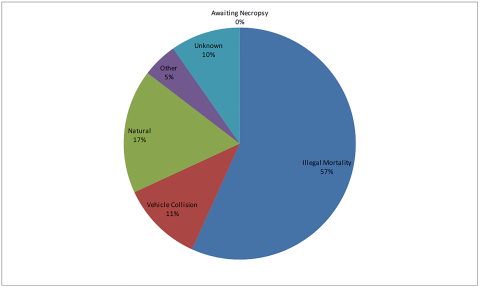The U.S. Fish and Wildlife Service is releasing draft revisions to the Mexican Wolf Recovery Plan, First Revision (2017 recovery plan) in order to improve protections for Mexican wolves in the wild.
Recovery Planning
The Endangered Species Act of 1973 (ESA), requires the development of recovery plans for listed species, unless such a plan would not promote the conservation of a particular species. This non-regulatory document identifies actions using the best available science to help recover the species. The recovery plan was developed with Arizona, New Mexico, Colorado and Utah; the Forest Service; federal agencies in Mexico; and scientific wolf experts from both countries.
Mexican Wolf Recovery Plan Background
There have been two previous Mexican wolf recovery plans:
- The original recovery plan in 1982 was developed by a recovery team but did not include recovery criteria because the Mexican wolf was extirpated from the wild and the recovery team questioned whether recovery was possible; and,
- The first revision in 2017 was developed in collaboration with the four states (Arizona, New Mexico, Colorado, Utah) and other partners using our new “Recovery Planning and Implementation” guidance (RPI). RPI is a process that streamlines recovery plans while maintaining the statutorily required elements (criteria, actions, time and cost estimates). The 2017 recovery plan includes recovery criteria for a population in the US and Mexico. We intend for the Mexican Wolf Experimental Population in Arizona and New Mexico to achieve the US criteria.
Remand of the 2017 revised recovery plan
The 2017 recovery plan was remanded by the District Court of Arizona in October 2021. To comply with the remand, the Service must develop recovery actions to address the threat of human-caused mortality and include them in a revised recovery plan. The remand includes deadlines for us to produce a draft revised plan six months from the October 14, 2021, ruling (April 14, 2021) and a final revised plan 12 months from the ruling.
Human-caused mortality
Human-caused mortality is one of three key threats to the Mexican wolf that need to be alleviated during the recovery effort. (Other threats include small population size and genetic issues). “Human-caused mortality” is a term that encompasses several types of mortality and is a concept widely used in wolf conservation.
The primary source of human-caused mortality to the Mexican wolf is illegal killing by gunshot, followed by, to a much lesser extent, vehicular mortality. Management removal may also be considered human-caused mortality: it is either the lethal removal of a wolf, or a wolf is removed to captivity and not returned to the wild, which acts as a mortality to the population. Management removals are conducted to address conflict situations with livestock or humans.
Draft Revised Recovery Plan, Second Revision
The draft revised recovery plan we have developed maintains all elements of the 2017 recovery plan, but adds new recovery actions to the plan’s Recovery Action Table with their time and cost estimates, as well as a narrative section “Recovery Actions Added to the Implementation Schedule to Address Human-Caused Mortality”.
Proposed actions
Actions that can reduce human-caused mortality include:
- Reducing malicious illegal killing through education, outreach, and increased law enforcement;
- Improving hunter awareness of the difference between coyotes and wolves so that wolves are not mistakenly shot;
- Installing roadway enhancements like signage, over and underpasses and fencing;
- And adaptively managing our removal rate in response to overall mortality rate to ensure the population is stable and growing.
These are the types of actions we have added to the plan, all of which were adapted from our separate implementation strategy, developed collaboratively with our partners and noted by the judge as pertinent forms of threat alleviation.
Comment period
There is a 30-day public comment period. The Final Revised Plan will be completed by October 14, 2022. To comment on the draft recovery plan, visit the Federal regulations website. Type the docket number, FWS-R2-ES-2022-0018, in the search bar. Comments will be accepted through May 16, 2022.




